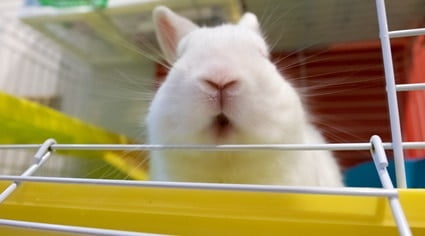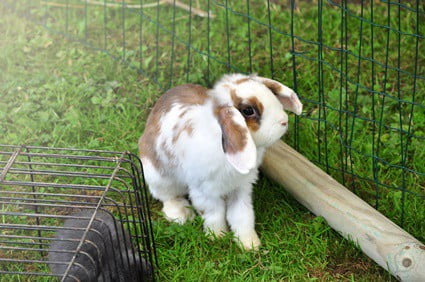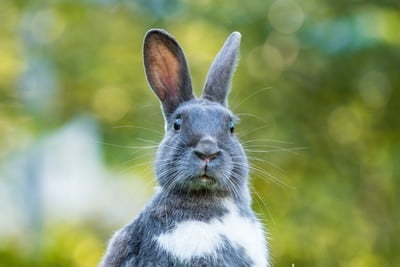Rabbits are often found grazing on their food for long periods of the day. But in some cases, the rabbit isn’t actually chewing on anything. While it might be easy to overlook, teeth issues are usually to blame. This is because a rabbit’s teeth are open-rooted, meaning they continuously grow. A rabbit must grind their teeth down to prevent overgrowth.
Rabbits grind their teeth to shorten them, which gives the impression that the rabbit is chewing on nothing. Dental disease is a real problem for rabbits. If left untreated, painful cuts and sores can occur inside the mouth and prevent a rabbit from eating altogether. Abscesses and misaligned teeth will also cause a rabbit to chew excessively. A rabbit should also be fed a diet rich in fibrous hay to aid with controlling teeth growth.
Understanding how your rabbit’s teeth should look and function will help you prevent any unnecessary chewing. However, in most cases, your pet is just doing what nature intending by filing down its teeth. This is normal, even if it doesn’t have food in its mouth. But if a rabbit’s excessive chewing is a product of pain, you’ll need to intervene.
Why Do Rabbits Chew on Nothing?
Rabbits have a distinctive chewing pattern in which they chew their food in circular motions. But rabbits sometimes make this movement with nothing inside their mouth. The most common causes are teeth and mouth issues, which encourage a rabbit to chew excessively. Because a rabbit’s teeth are continually growing, rabbits have to grind to keep their teeth short.
However, a rabbit’s teeth can quickly become a problem if they grow faster than what a rabbit can cope with. While chewing is normal in most cases, it’s difficult to tell when a rabbit is in pain because they’re experts at it. So, if you notice your rabbit chewing on nothing, these are some of the most common reasons:
Overgrown Incisors
A rabbit’s incisors grow between 2.0 – 2.4mm a week, which means that they can become overgrown at a fast rate. When overgrown, a rabbit’s front teeth become too long and cause a range of problems and become painful inside the mouth. They can also stop a rabbit from comfortably opening its mouth, preventing the rabbit from eating altogether.
A rabbit will grind its teeth down to keep them at a comfortable length. This gives the illusion that the animal is chewing on food. During the chewing process, a rabbit produces enough saliva to coat the mouth and smooth sharp teeth edges by continuously moving its mouth round. By blunting its teeth, a rabbit can prevent painful cuts and sores while ensuring the mouth functions as it should.
Molar Spurs
As described by the University of Miami, molar spurs are a painful problem. Spurs are sharp points on the edges of the molars caused by uneven wear. They can form on either the lower or upper molars and poke towards the tongue or cheek, stabbing them and causing pain.
However, because rabbits are prey animals, they do not show signs of pain. Doing so would leave them vulnerable to attack in the wild. Instead, they try to deal with the molar issue themselves by grinding the sharp points down to ease the pain. When a rabbit grinds its teeth down, it looks like it is eating, even if it is in severe distress.
Older rabbits are more prone to molar spurs than bunnies. If left untreated, molar spurs can grow into the cheek or tongue, making it difficult for a rabbit to eat. Therefore, a veterinarian must address the cause to solve the problem. As well as excessive chewing, symptoms of molar spurs include:
- A lack of appetite or selectiveness with food
- Lethargy
- Dropping or spitting out food from the mouth
- Red spots or cuts on the tongue or cheeks
- Blood coming from the mouth
Monitor your rabbit every few days to check for any of the above. And if your rabbit allows it, look inside the mouth for any obvious signs of pain or discomfort that might be causing it to chew more often than it should.

Abscess
An abscess is a painful cavity consisting of pus and inflamed tissue. A bacterial infection causes mouth abscesses in the root of the tooth. The pus is an accumulation of dead skin cells where the body has attempted to fight the infection.
Unfortunately, abscesses are often deep-rooted and need to be cleaned down to the bone. They’re also painful, so a rabbit will often chew to try and remove the foreign object itself or distract itself from the pain.
Similarly, if an abscess has been recently removed, a rabbit’s jaw may feel misaligned, causing it to make circular jaw motions in the attempt to get used to the new feeling inside its mouth. This should ease after a few days as the abscess symptoms subside.
Unlike other species, abscesses are challenging to treat in rabbits. They don’t respond very well to treatment, and the infection is almost impossible to cure. Abscesses are also prone to reoccurring due to how deep they occur in the root of the teeth or jaw, causing regular mouth and teeth problems.
Treatment to remove the abscess and stop a rabbit from chewing consists of radical surgery, which involves removing the abscess and surrounding issue. Antibiotics can also prevent the abscess from reforming, though it often does come back.
Abscesses feel like bulging water-filled balloons. If your rabbit has started to chew without food in its mouth, check along the jawline for any sign of inflammation.
Malocclusions
Malocclusions, or misaligned teeth, is when the teeth don’t meet correctly, causing them to overgrow. When this happens, a rabbit suffers from painful ulcers of the teeth and gums and struggles to keep its teeth ground down.
A common symptom of malocclusions is excessive teeth grinding. This is why you might see your rabbit chewing, even though it’s not eating anything. Other painful and uncomfortable symptoms of misaligned teeth include:
- Cuts and ulcers of the cheeks and tongue
- A refusal to eat
- Drooling or wetness around its mouth and chin
- Inability to open the mouth or chew food
- Recurring anorexia
- Diarrhea caused by eating problems
If a rabbit can’t keep its teeth ground down naturally, a vet may need to clip or file the teeth down. Some maloccluded incisors need to be extracted, but this is a permanent process – the teeth won’t grow back. Also, rabbit owners will need to cut fresh food into bite-sized pieces to make it easier for them to chew and consume food.
How to Prevent Your Rabbit from Always Chewing
There are plenty of things you can do to stop your rabbit from chewing without food in its mouth. While your rabbit needs to grind down its teeth, there are times when human intervention is required. To keep your rabbit happy and healthy, follow these steps:
Control Its Diet
Your rabbit’s diet should consist of around 80 to 90% high-quality grass hay. Because it’s fibrous, hay helps rabbits wear their molars down to a comfortable length. Pellets, treats, and leafy green vegetables should be given in moderation. If not, rabbits will fill up on these foods before eating the hay, allowing the teeth to grow too long. This, in turn, will cause a rabbit to start excessively chewing.
Monitor Eating Habits
If your rabbit keeps grinding its teeth, it’s crucial to ascertain whether your rabbit can eat. If your rabbit stops doing any of the following, you will need to investigate the reason why with your vet:
- Your rabbit avoids hard pellets and fibrous hay and only chews on easy to eat vegetables
- It has lost its appetite and refuses to eat
- It sniffs its food then walks away from it
- Your rabbit excessively drools
- Its breath has a foul or sour odor
If you notice any of the above, your rabbit’s chewing is a sign of an underlying health problem, and it is not solely because your pet is merely grinding its teeth down.
If a rabbit can’t eat, it often causes more problems than the overgrown teeth themselves. Before your rabbit is able to receive treatment, you may need to hand feed your pet to ensure it receives sufficient nourishment. At the very least, shred your rabbit’s hay and cut treats into easy to eat pieces.
Recognize Teeth Issues
Understanding how a rabbit’s teeth should look and function will help you see when something’s wrong. Rabbits have 28 teeth in total, so check them regularly for any signs of overgrowth. Also, keep an eye on the following problems:
Overgrown Molars
If a rabbit doesn’t do a good enough job of grinding their molars down, the jaw may be pushed too far apart, affecting how the incisors meet. This will cause a rabbit to grind its teeth to file them down.
Curved Molars
Rabbits that don’t get enough fibrous food in their diet may find their upper molars curve, cutting into the cheek and causing painful cuts and ulcers. The teeth may also cut into the tongue. A poor diet will also cause the molars to grow crooked, leading to discomfort inside the mouth. When this happens, a rabbit is trying to solve the problem inside its mouth or distract itself from the pain.
Tooth Root Inflammation
When a rabbit cannot grind its teeth down, the teeth hit one another, leading to inflammation of the tooth root. This can cause painful abscesses and bacterial infections. A rabbit will grind its teeth to cope with the pain, which gives the impression it is chewing on food.
Check to see that your rabbit’s teeth meet correctly. If you hear your rabbit’s teeth bashing together as your rabbit chews, they are not in the right position.
Treating Rabbit Dental Disease
To stop your rabbit from excessive chewing or grinding, you’ll need to treat its dental disease. Treatment will involve a combination of surgery, pain relief, and medication. Diet changes may also help.
As described by the College of Veterinary Medicine, if the dental disease becomes advanced and your rabbit can’t trim its teeth with hay and other fibrous materials, tooth trimming or extraction needs to be undertaken by a veterinarian.
This procedure is performed under local anesthetic. While this surgery comes with risks, it will allow your rabbit to live an everyday, pain-free life. Periodic tooth trimmings are likely for the remainder of your pet’s life.
It’s also crucial that rabbits have access to an unlimited supply of grass hay. If they run out too quickly, the tooth grinding process will fail. Also, rabbits enjoy grazing on small amounts throughout the day as opposed to large quantities at once.
Avoid hay containing alfalfa as it’s higher in carbohydrates and calcium, leading to health problems or digestive issues as a rabbit gets older.
Baby Bunny Keeps Opening and Closing Mouth
Bunnies are less likely to suffer from dental issues as their teeth are only just developing. So when your baby rabbit opens and closes its mouth, it can be a sign of something serious. These are the most common reasons:
Respiratory Failure
Baby bunnies are fragile creatures, so unusual mouth movements indicate respiratory failure. Open-mouthed breathing is a poor prognostic sign, and your rabbit will require immediate veterinary treatment. Make a note of any irregular breathing signs such as rattling, snoring, or squeaks as this will help your vet diagnose the problem.
Stress
General or prolonged stress can also cause your bunny to open and close its mouth. Rabbits that are fed unhealthy diets or who are left unattended in a dark, poorly ventilated cage are the most common stress triggers. Similarly, rabbits that live too close to predator animals will have a hard time feeling comfortable.
Foreign Bodies
If your rabbit has a piece of hay or grass seed stuck in its nasal passages, it will struggle to breathe. As a result, it will begin to breathe through its mouth instead. A tell-tale sign of foreign bodies is nasal discharge or foul breath odor. In most cases, foreign bodies are easy to remove, but it must be done so by a vet to prevent any serious damage.

Teeth Discomfort
That being said, bunnies can still suffer from discomfort while their teeth are developing. Just like babies, baby rabbits lose their milk teeth. In some cases, this process is uncomfortable for some rabbits, who respond by opening and closing their mouths to cope with the sensation.
However, most bunnies wear their teeth down by chewing on hay or their wooden cage. This process is natural, but it’s important to monitor your bunny’s behavior during this stage for any signs of distress, particularly if it starts chewing excessively.
Your rabbit has a natural instinct and knows what to do when it comes to its teeth. But the problem lies when it physically can’t regulate the shape and size of its molars and incisors. This is what causes rabbits to chew on nothing. Though long-term, this will do more damage than good. Always monitor your rabbit’s teeth for any obvious changes or signs of pain.

